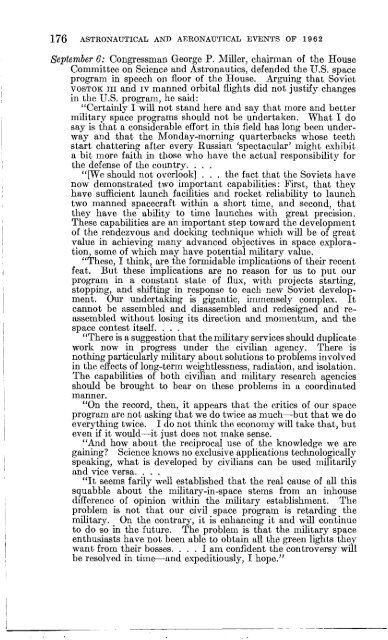- Page 1 and 2:
[COMMITTEE PRINT] ASTRONAUTICAL AND
- Page 3 and 4:
COMMITTEE ON SCIENCE AND ASTRONAUTI
- Page 5 and 6:
ASTRONAUTICAL AND AERONAUTICAL CONT
- Page 7 and 8:
JANUARY 1962 January 1: National Bu
- Page 9 and 10:
ASTRONAUTICAL AND AERONAUTICAL EVEN
- Page 11 and 12:
ASTRONAUTICAL AND AERONAUTICAL EVEN
- Page 13 and 14:
ASTRONAUTICAL AND AERONAUTICAL EVEN
- Page 15 and 16:
ASTRONAUTICAL AND AERONAUTICAL EVEN
- Page 17 and 18:
ASTRONAUTICAL AND AERONAUTICAL EVEN
- Page 19 and 20:
ASTRONAUTICAL AND AERONAUTICAL EVEN
- Page 21 and 22:
ASTRONAUTICAL AND AERONAUTICAL EVEN
- Page 23 and 24:
ASTRONAUTICAL AND AERONAUTICAL EVEN
- Page 25 and 26:
ASTRONAUTICAL AND AERONAUTICAL EVEN
- Page 27 and 28:
ASTRONAUTICAL AND AERONAUTICAL EVEN
- Page 29 and 30:
ASTRONAUTICAL AND AERONAUTICAL EVEN
- Page 31 and 32:
ASTRONAUTICAL AND AERONAUTICAL EVEN
- Page 33 and 34:
MARCH 1962 March 1: John Glenn Dav
- Page 35 and 36:
ASTRONAUTICAL ANb AERONAUTIC& EVENT
- Page 37 and 38:
ASTRONAUTICAL AND AERONAUTICAL EVEN
- Page 39 and 40:
ASTRONAUTICAL AND AERONAUTICAL EVEN
- Page 41 and 42:
ASTRONAUTICAL AND AERONAUTICAL EVEN
- Page 43 and 44:
ASTRONAUTICAL AND AERONAUTICAL EVEN
- Page 45 and 46:
ASTRONAUTICAL AND AERONAUTICAL EVEN
- Page 47 and 48:
ASTRONAUTICAL AND AERONAUTICAL EVEN
- Page 49 and 50:
ASTRONAUTICAL AND AERONAUTICAL EVEN
- Page 51 and 52:
ASTRONAUTICAL AND AERONAUTICAL EVEN
- Page 53 and 54:
ASTRONAUTICAL AND AERONAUTICAL EVEN
- Page 55 and 56:
ASTRONAUTICAL AND AERONAUTICAL EVEW
- Page 57 and 58:
ASTRONAUTICAL AND AERONAUTICAL EVEN
- Page 59 and 60:
ASTRONAUTICAL AND AERONAUTICAL EVEN
- Page 61 and 62:
ASTRONAUTICAL AND AERONAUTICAL EVEN
- Page 63 and 64:
ASTRONAUTICAL AND AERONAUTICAL EVEN
- Page 65 and 66:
ASTRONAUTICAL AND AERONAUTICAL EVEN
- Page 67 and 68:
ASTRONAUTICAL AND AERONAUTICAL EVEN
- Page 69 and 70:
ASTRONAUTICAL AND AERONAUTICAL EVEN
- Page 71 and 72:
ASTRONAUTICAL AND AERONAUTICAL EVEN
- Page 73 and 74:
MAY 1962 May 1: International Commi
- Page 75 and 76:
ASTRONAUTICAL AND AERONAUTICAL EVEN
- Page 77 and 78:
ASTRONAUTICAL AND AERONAUTICAL EVEN
- Page 79 and 80:
ASTRONAUTICAL AND AERONAUTICAL EVEN
- Page 81 and 82:
May 10: House Science and Astronaut
- Page 83 and 84:
ASTRONAUTICAL AND AERONAUTICAL EVEN
- Page 85 and 86:
ASTRONAUTICAL AND AERONAUTICAL EVEN
- Page 87 and 88:
ASTRONADTICAL AND AERONAUTICAL EVEN
- Page 89 and 90:
ASTROhtAtFPICAL AND AERONAU’PICAL
- Page 91 and 92:
ASTRONAUTICAL AND AERONAUTICAL EVEN
- Page 93 and 94:
ASTRONAUTICAL AND AERONAUTICAL EVEN
- Page 95 and 96:
ASTRONAUTICAL AND AERONAUTICAL EVEN
- Page 97 and 98:
ASTRONAUTICAL AND AERONAUTICAL EVEN
- Page 99 and 100:
JUNE 1962 June 1: x-15 No. 2 flown
- Page 101 and 102:
ASTBONAUTICAL AND AERONAUTICAL EVEN
- Page 103 and 104:
ASTRONAUTICAL AND AERONAUTICAL EVEN
- Page 105 and 106:
ASTRONAUTICAL AND AERONAUTICAL EVEN
- Page 107 and 108:
ASTRONAUTICAL AND AERONAUTICAL EVEN
- Page 109 and 110:
ASTRONAUTICAL AND AERONAUTICAL EVEN
- Page 111 and 112:
ASTRONAUTICAL AND AERONAUTICAL EVEN
- Page 113 and 114:
ASTRONAUTICAL 1Wb AERONAD‘I‘ICA
- Page 115 and 116:
ASTRONAUTICAL AND AERONAUTICAL EVEN
- Page 117 and 118:
ASTRONAUTICAL AND AERONAUTICAL EVEN
- Page 119 and 120:
ASTRONAUTICAL AND AERONAUTICAL EVEN
- Page 121 and 122:
ASTRONAUTICAL Ahtb AERO~AU’I’IC
- Page 123 and 124:
ASTRONAUTICAL AND AERONAUTICAL EVEN
- Page 125 and 126:
ASTRONAUTICAL AND AERONAUTICAL EVEN
- Page 127 and 128:
ASTRONAUTICAL AND AERONAUTICAL EVEN
- Page 129 and 130:
ASTRONAUTICAL AND AERONAUTICAL EVEN
- Page 131 and 132: ASTRONAUTICAL AND AERONAUTICAL EVEN
- Page 133 and 134: ASTRONAUTICAL AND AERONAUTICAL EVEN
- Page 135 and 136: ASTRONAUTICAL AND AERONAUTICAL EVEN
- Page 137 and 138: ASTRONAUTICAL AND AERONAUTICAL EVEN
- Page 139 and 140: I‘ ASTRONAUTICAL AND AERONAUTICAL
- Page 141 and 142: ASTRONAUTICAL AND AERONAUTICAL EVEN
- Page 143 and 144: ASTRONAUTICAL AND AERONAUTICAL EVEN
- Page 145 and 146: ASTRONAUTICAL AND AERONAUTICAL EVEN
- Page 147 and 148: ASTRONAUTICAL AND AERONAUTICAL EVEN
- Page 149 and 150: ASTRONAUTICAL AND AERONAUTICAL EVEN
- Page 151 and 152: ASTRONAUTICAL AND AERONAUTICAL EVEN
- Page 153 and 154: ASTRONAUTICAL AND AERONAUTICAL EVEN
- Page 155 and 156: ASTRONAUTICAL AND AERONAUTICAL EVEN
- Page 157 and 158: ASTRONAUTICAL AND AERONAUTICAL EVEN
- Page 159 and 160: ASTRONAUTICAL AND AERONAUTICAL EVEN
- Page 161 and 162: ASTRONAUTICAL AND AERONAUTICAL EVEN
- Page 163 and 164: ASTRONAUTICAL AND AERONAUTICAL EVEN
- Page 165 and 166: ASTRONAUTICAL AND AERONAUTICAL EVEN
- Page 167 and 168: ASTRONAUTICAL AND AERONAUTICAL EVEN
- Page 169 and 170: ASTRONAUTICAL AND AERONAUTICAL EVEN
- Page 171 and 172: ASTRONAUTICAL AND AERONAUTICAL EVEN
- Page 173 and 174: ASTRONAUTICAL AND AERONAUTICAL EVEN
- Page 175 and 176: SEPTEMBER 1962 September 1: NASA Ve
- Page 177 and 178: ASTRONAUTICAL AND AERONAUTICAL EVEN
- Page 179 and 180: ASTRONAUTICAL AND AERONAUTICAL EVEN
- Page 181: ASTRONAUTICAL AND AERONAUTICAL EVEN
- Page 185 and 186: ASTRONAUTICAL AND AERONAUTIC& EVENT
- Page 187 and 188: ASTRONAUTICAL AND AERONAUTICAL EVEN
- Page 189 and 190: ASTRONAUTICAL AND AERONAUTICAL EVEN
- Page 191 and 192: ASTRONAUTICAL AND AERONAUTICAL EVEN
- Page 193 and 194: ASTRONAUTICAL AND AERONAUTICAL EVEN
- Page 195 and 196: ASTRONAUTICAL AND AERONAUTICAL EVEN
- Page 197 and 198: ASTRONAUTICAL AND AERONAUTICAL EVEN
- Page 199 and 200: ASTRONAUTICAL AND AERONAUTICAL EVEN
- Page 201 and 202: ASTRONAUTICAL AND AERONAUTICAL EVEN
- Page 203 and 204: ASTRONAUTICAL AND AERONAUTICAL EVEN
- Page 205 and 206: ASTRONAUTICAL AND AERONAUTICAL EVEN
- Page 207 and 208: ASTRONAUTICAL AND AERONAUTICAL EVEN
- Page 209 and 210: ASTRONAUTICAL AND AERONAUTICAL EVEN
- Page 211 and 212: ASTRONAUTICAL AND AERONAUTICAL EVEN
- Page 213 and 214: ASTRONAUTICAL AND AERONAUTICAL EVEN
- Page 215 and 216: ASTRONAUTICAL AND AERONAUTICAL EVEN
- Page 217 and 218: ASTRONAUTICAL AND AERONAUTICAL EVEN
- Page 219 and 220: ASTRONAUTICAL AND AERONAUTICAL EVEN
- Page 221 and 222: ASTRONAUTICAL AND AERONAUTICAL EVEN
- Page 223 and 224: ASTRONAUTICAL AND AERONAUTICAL EVEN
- Page 225 and 226: ASTRONAUTICAL AND AERONAUTICAL EVEN
- Page 227 and 228: ASTRONAUTICAL AND AERONAUTICAL EVEN
- Page 229 and 230: ASTRONAUTIC& AND AERONAUTICAL EVENT
- Page 231 and 232: ASTRONAUTICAL AND AERONAUTICAL EVEN
- Page 233 and 234:
ASTRONAUTICAL AND AERONAUTICAL EVEN
- Page 235 and 236:
ASTRONAUTICAL AND AERONAUTICAL EVEN
- Page 237 and 238:
ASTRONAUTICAL AND AERONAUTICAL EVEN
- Page 239 and 240:
ASTRONAUTICAL AND AERONAUTICAL EVEN
- Page 241 and 242:
ABlXONAUTICAL AND AERONAUTICAL EVEN
- Page 243 and 244:
ASTRONAUTICAL AND AERONAUTICAL EVEN
- Page 245 and 246:
ASTRONAUTICAL AND AERONAUTICAL EVEN
- Page 247 and 248:
ASTRONAUTICAL AND AERONAUTICAL EVEN
- Page 249 and 250:
ASTRONAUTICAL AND AERONAUTICAL EVEN
- Page 251 and 252:
ASTRONAUTICAL AND AERONAUTICAL EVEN
- Page 253 and 254:
ASTRONAUTICU AND AERONAUTICAL EVENT
- Page 255 and 256:
ASTRONAUTICAL AND AERONAUTICAL EVEN
- Page 257 and 258:
F ASTRONAUTICAL AND AERONAUTICAL EV
- Page 259 and 260:
ASTRONAUTICAL AND AERONAUTICAL EVEN
- Page 261 and 262:
ASTRONAUTICAL AND AERONAUTICAL EVEN
- Page 263 and 264:
DECEMBER 1962 December 1: Three sou
- Page 265 and 266:
ASTRONAUTICAL AND AERONAUTICAL EVEN
- Page 267 and 268:
ASTRONAUT‘ICAL AND AERONAUTICAL E
- Page 269 and 270:
ASTRONAUTICAL AND AERONAUTICAL EVEN
- Page 271 and 272:
ASTRONAUTICAL AND AERONAUTICAL EVEN
- Page 273 and 274:
ASTRONATJTICAL AND AERONAUTICAL EVE
- Page 275 and 276:
ASTRONAUTICAL AND AERONAUTICAL EVEN
- Page 277 and 278:
ASTRONAUTICAL AND AERONAUTICAL EVEN
- Page 279 and 280:
ASTRONAUTICAL AND AERONAUTICAL EVEN
- Page 281 and 282:
ASTRONAUTICAL AND AERONAUTICAL EVEN
- Page 283 and 284:
ASTRONAUTICAL AND AERONAUTICAL EVEN
- Page 285 and 286:
ASTRONAUTICAL AND AERONAUTICAL EVEN
- Page 287 and 288:
ASTRONAUTICAL AND AERONAUTICAL EVEN
- Page 289 and 290:
ASTRONAUTICAL AND AERONAUTICAL EVEN
- Page 291 and 292:
APPENDIX A SATELLITES, SPACE PROBES
- Page 293 and 294:
Feb. 21 Feb. 27 Mar. 7 Mar. 7 Mar.
- Page 295 and 296:
Apr. 26 Apr. 28 May 16 May 24 May 2
- Page 297 and 298:
Jul. % Jul. % Aug. 1 Ang. E Aug. 11
- Page 299 and 300:
8ep. 1 sep. 1 8ep. 17 Sep. 18 Sep.
- Page 301 and 302:
Oct. 20 Oct. 26 Oct. a7 Oct. 31 Nov
- Page 303 and 304:
Dec. 16 Dec. 18 Dec. 18 Dee. 22 Dur
- Page 305 and 306:
Date 1968 Oct 11 Oct n Nov 8 Dec 6
- Page 307 and 308:
- Date Name 1960 Nov 23 lTEO9 II __
- Page 309 and 310:
Date -. 1068 Apr 22 Aug 31 Sep 11 S
- Page 311 and 312:
INDEX A-2. See Polaris. A-3. See Po
- Page 313 and 314:
Alexandria Virginia, 51 Alfred A. 6
- Page 315 and 316:
INDEX 31 1 Arizona. Univ. of. 220 A
- Page 317 and 318:
a INDEX 313 Australia launch, 90 re
- Page 319 and 320:
Boeing Airplane Co., 107, 224 contr
- Page 321 and 322:
Cell, fuel, 45 Cells, solar, 35, 21
- Page 323 and 324:
ENDEX 319 Corporation, Communicatio
- Page 325 and 326:
INDEX Douglas Aircraft Co., 111, 13
- Page 327 and 328:
EXPLORER VI, 300 EXPLORER VII, 300
- Page 329 and 330:
Gagarin, L/C Yuri A. appearances, 8
- Page 331 and 332:
IN'DEX 327 Goldstone Tracking Stati
- Page 333 and 334:
INDEX Hoffman, Samuel K., 134, 246
- Page 335 and 336:
INDEX 331 International space progr
- Page 337 and 338:
Kennedy, Robert F., 138 Kentucky, U
- Page 339 and 340:
Life science (see also Bioscience),
- Page 341 and 342:
Management Intern Program (NASA), 1
- Page 343 and 344:
INDEX 339 Mercury-Atlas 5 (MA-5), 7
- Page 345 and 346:
INDEX 341 Moon base on, 4, 36, 42,
- Page 347 and 348:
INDEX 343 National Aeronautics and
- Page 349 and 350:
INDEX 345 New York International Ai
- Page 351 and 352:
Os0 (Orbiting Solar Observatory) (p
- Page 353 and 354:
INDEX 349 Pope AFB, North Carolina,
- Page 355 and 356:
Reactor. See Nuclear. Reactor-in-Fl
- Page 357 and 358:
Saint, Project, 259 St. Thomas, Vir
- Page 359 and 360:
Seamans, Dr. Robert C., Jr., 24, 63
- Page 361 and 362:
Space, 43 Space Act. See National A
- Page 363 and 364:
INDEX Sternberg Astronomical Instit
- Page 365 and 366:
INDEX 361 Thompson Ram0 Wooldridge,
- Page 367 and 368:
INDEX 363 United Nations (U.N.), 1,
- Page 369 and 370:
INDEX 365 U.S.S. Intrepid, 86 U.S.S
- Page 371 and 372:
Wagner, Dr. Bernard M., 173 Wahiawa
- Page 373 and 374:
Wisconsin, 212 Wisconsin, Universit
















